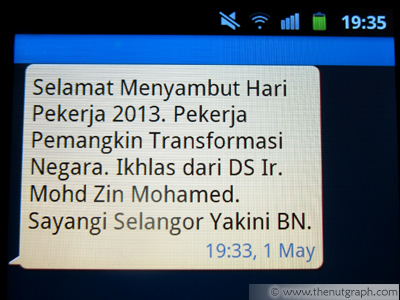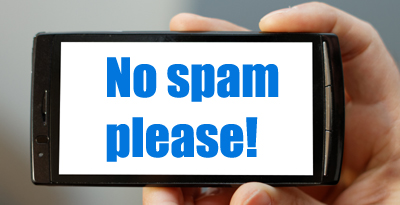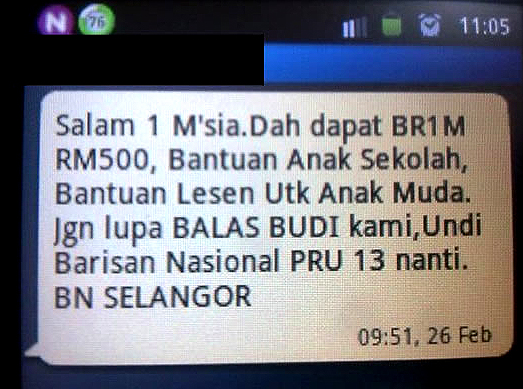
AS early as 2010, the Barisan Nasional (BN) began sending the occasional SMS to mobile phone users. Many of these were fairly innocuous, wishing recipients Happy Chinese New Year or Merry Christmas, for example. But then recipients began reporting, mostly in their blogs and Facebook posts, that they were receiving birthday greetings from BN politicians as well. The Selangor BN coordinator, Datuk Seri Mohd Zin Mohamed, was identified as the sender of many such messages.
In the run-up to the dissolution of Parliament on 20 April 2013 and during the current campaign period, many mobile phone users — anecdotally, most of them seem to be those with 012 and 019 numbers — have reported receiving up to three SMS a day containing pro-BN messages such as the following:
AKUJANJI BN S’GOR. Menaiktarafkan SRJK (C) & SRJK (T) terpilih untuk jadikan Sekolah Berprestasi Tinggi untuk rakyat Selangor. UNDILAH BN
AKUJANJI BN Pusat Khidmat Rakyat Selangor (PAKAR) akan ditubuh di semua majlis bandaran bagi membantu menyelesaikan masalah rakyat. UNDILAH BN
Many have questioned, “How did they get my number or personal details?” Indeed, is political campaigning via SMS legal? Isn’t it a breach of privacy? And what are the authorities doing about it?
Who sold my number?
Most people tend to blame their mobile service provider. However, telco providers have good reason not to sell the personal data of their customers, namely, it would be a grievous breach of customer trust. Further, the implementation of Mobile Number Portability (MNP) makes it difficult to determine conclusively if recipients are specific customers of one telco or another. A user with an 012 number may not be a Maxis customer but may be a Digi or Celcom customer.
If not the telco, then who is selling our phone numbers? Customer profile databases — which include mobile phone numbers, gender, race and sometimes income information — are openly available for purchase from various corporations that have a big customer base, such as credit card companies, banks and media entities. Anyone who has ever SMSed their details to participate in a competition is likely to have their details stored in a database somewhere. And this database is likely to be available for sale or exchange at some point.
However, it is not yet an offence for a corporate entity to sell or exchange customer data collected over the years to a third party. Although the Personal Data Protection Act was passed in 2010 and slated to come into force on 31 Jan 2013, it has yet to be enforced. Which means there is no digital protection afforded to consumers over their personal data, which includes mobile phone numbers. Further, Malaysians do not have a constitutionally mandated right to privacy.
No help from telcos
Fine, you say – so they have my number. Is there anything I can do to stop these messages from being sent to my phone?

In theory, your mobile phone service provider should be able to assist you. If you have been receiving BN text messages from the same number, you can request for all communications from that number to be barred. After all, it’s arguably no different from being stalked.
However, telcos do not allow routine barring of numbers on request. Even if you insist on a number being barred from contacting you, the telco will not necessarily comply. For example, Digi Telecommunications considers SMSes that are not from a short code (8000 or 6000, etc) to be “peer-to-peer messages”. Accordingly, the onus is on the recipient to deal with the matter:
“The receiver can proactively block the sender’s number from their mobile device if he/she wishes to stop receiving them,” Digi Telecommunications said in a reply via Facebook.
At the time of writing, Maxis and Celcom had not responded to questions on standard operating procedures on text messages from the BN.
Intention to annoy?
What about the Malaysian Communication and Multimedia Commission (MCMC)? As regulators of the telecommunications industry, surely they can do something about this? On their website, the MCMC discusses Spam Laws, with a specific reference to Section 233(1)(b) of the Communications and Multimedia Act 1998:
“… a person who initiates a communication using any applications service, whether continuously, repeatedly or otherwise, during which communication may or may not ensue, with or without disclosing his identity and with intent to annoy, abuse, threaten or harass any person at any number or electronic address, commits an offence.”
And one guilty of such an offence is liable to a fine not exceeding RM50,000 or jail not exceeding one year, or both, as well as a further fine of RM1,000 per day that the offence continues after conviction.
However, the MCMC itself acknowledges that the law is hard to enforce when it comes to spam. It states on its website that “such intention may not exist, given that people who initiate such communication for marketing and advertising purposes are unlikely to initiate such communication with the intent to annoy, abuse, threaten or harass potential clients”.
Even if the MCMC took up a case, they would be hard-pressed to demonstrate such intent on the part of the senders of the messages, who may well argue they were merely sharing relevant information.
In the BN’s case, its Deputy Minister of Information, Communications and Culture, Joseph Salang Gandum, clearly thought nothing of privacy concerns when asked if such messages were a breach of the Personal Data Protection Act. His official parliamentary response to Teo Nie Ching, the Member of Parliament of Serdang who asked the question, was: “It does not breach basic rights. It is to show love. This message, which I think is nice (cantik) shows love and it pleases someone to know that their MP knows when they were born.”
So, it would seem that when it comes to these “loving” BN SMSes, hitting the delete button is pretty much all you can do.

Election spam: Here to stay?
Depending on the results of the coming general election, the weapons of mass persuasion that have been unleashed on the electorate in the last three years – from “caring” SMSes, to the tasteless public service announcements in the newspapers and on the radio, and to the robocalls – may simply go away when they are shown to be ineffectual, or worse, turn off voters.
Further, the Personal Data Protection Act would hopefully, by the next GE, have come into force, making the free use and exchange of data collected by commercial entities (the government remains exempt) more difficult.
Still, perhaps it is high time that Malaysians focused on greater protection of their personal information from the government. Should there be a change of government come 6 May, perhaps along with all the other draconian acts that ought to be abolished, there should be the addition of a law that protects Malaysians from needless contact by the government and political parties. Then Malaysians won’t have to deal with election spam when the next general election is due. ![]()
Before blogging for Cnet Asia for five years, Bernice Low had a brief stint as a lawyer. When not writing on technology issues, she writes screenplays.


Jacqueline Ann Surin says
“The receiver can proactively block the sender’s number from their mobile device if he/she wishes to stop receiving them,” Digi Telecommunications said in a reply via Facebook.
Question: How does one do that? What does that entail?
pengtuck says
1. Add ‘Sender’ to Contacts.
2. Block Contact from Phone Book.
This feature is available in most Android phones (at least 1 year back), but relies on the user to take action.
Alex Lau says
I am currently using HTC One – X.
It comes with a mode whether to accept calls or to block SMS.
I have managed to block most of Celcom’s annoying SMSes which include competitions and ads.
I am not sure about other smartphones but perhaps there is an app somewhere to block these SMSes.
One of the free apps that I am aware of is the AVG Antivirus app which enables users to block these unwanted SMSes.
To be fair, I have not received any SMSes from BN. So I can’t really say whether it will work especially if the number is a private number, one that does not show the identity of the caller. However if it does reveal the identity of the caller, i.e. their telephone number, I am quite positive it will work.
Hope this helps.
Tim says
Quoting a famous Steve, “There’s an app for that.”
Jacqueline Ann Surin says
Thank you, Alex and pengtuck.
Chen says
I really wonder at the stupidity of BN’s propaganda machine. These SMSes are annoying people. Some will inevitably get so mad at being interrupted and spending time deleting them that they will purposely vote for any other party except BN. Don’t they ever pay attention to the angry feedback about these SMSes that’s all over the place?
For non-smartphone users, I have used (and occasionally am still using) a cheap basic Samsung flip phone (2012 model) and it comes with an inbuilt call/SMS blocker. I love it. So for readers here who are looking for a non-smartphone that can block calls – go check it out.